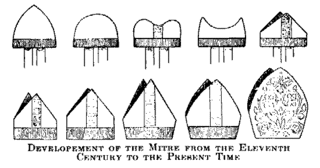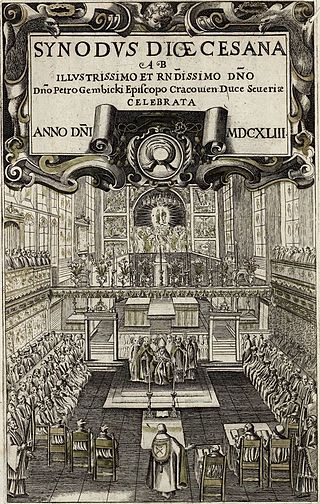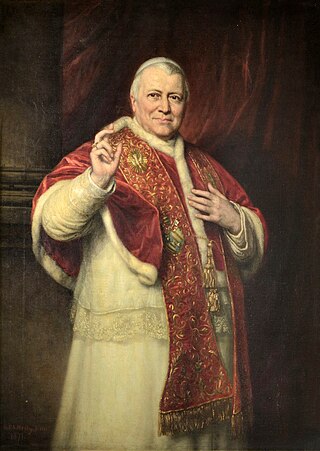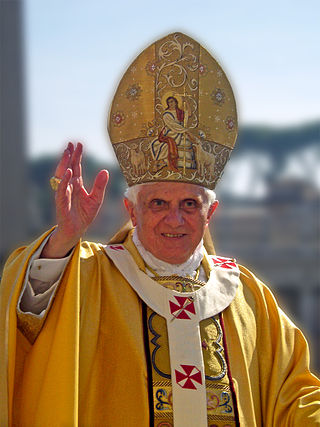
An ecumenical council, also called general council, is a meeting of bishops and other church authorities to consider and rule on questions of Christian doctrine, administration, discipline, and other matters in which those entitled to vote are convoked from the whole world (oikoumene) and which secures the approbation of the whole Church.

An episcopal polity is a hierarchical form of church governance in which the chief local authorities are called bishops. It is the structure used by many of the major Christian Churches and denominations, such as the Catholic, Eastern Orthodox, Oriental Orthodox, Church of the East, Anglican, Lutheran and Methodist churches or denominations, and other churches founded independently from these lineages.
The Roman Curia comprises the administrative institutions of the Holy See and the central body through which the affairs of the Roman Catholic Church are conducted. The Roman Curia is the institution which the Roman Pontiff ordinarily makes use of in the exercise of his supreme pastoral office and universal mission in the world. It is at the service of the Pope, successor of Peter, and of the Bishops, successors of the Apostles, according to the modalities that are proper to the nature of each one, fulfilling their function with an evangelical spirit, working for the good and at the service of communion, unity and edification of the Universal Church and attending to the demands of the world in which the Church is called to fulfill its mission.

Ultramontanism is a clerical political conception within the Catholic Church that places strong emphasis on the prerogatives and powers of the Pope. It contrasts with Gallicanism, the belief that popular civil authority—often represented by the monarch's or state's authority—over the Church is comparable to that of the Pope.

A synod is a council of a Christian denomination, usually convened to decide an issue of doctrine, administration or application. The word synod comes from the Greek: σύνοδος [ˈsinoðos] meaning "assembly" or "meeting" and is analogous with the Latin word concilium meaning "council". Originally, synods were meetings of bishops, and the word is still used in that sense in Catholicism, Oriental Orthodoxy and Eastern Orthodoxy. In modern usage, the word often refers to the governing body of a particular church, whether its members are meeting or not. It is also sometimes used to refer to a church that is governed by a synod.

The magisterium of the Roman Catholic Church is the church's authority or office to give authentic interpretation of the Word of God, "whether in its written form or in the form of Tradition." According to the 1992 Catechism of the Catholic Church, the task of interpretation is vested uniquely in the Pope and the bishops, though the concept has a complex history of development. Scripture and Tradition "make up a single sacred deposit of the Word of God, which is entrusted to the Church", and the magisterium is not independent of this, since "all that it proposes for belief as being divinely revealed is derived from this single deposit of faith."

Papal primacy, also known as the primacy of the bishop of Rome, is a Roman Catholic ecclesiological doctrine concerning the respect and authority that is due to the pope from other bishops and their episcopal sees. The doctrine is accepted at a fundamental level by both the Catholic Church and Eastern Orthodox Church, though the two disagree on the nature of primacy.
College of Bishops, also known as the Ordo of Bishops, is a term used in the Catholic Church to denote the collection of those bishops who are in communion with the Pope. Under Canon Law, a college is a collection of persons united together for a common object so as to form one body. The Bishop of Rome is the head of the college.
The infallibility of the Church is the belief that the Holy Spirit preserves the Christian Church from errors that would contradict its essential doctrines. It is related to, but not the same as, indefectibility, that is, "she remains and will remain the Institution of Salvation, founded by Christ, until the end of the world." The doctrine of infallibility is premised on the authority Jesus granted to the apostles to "bind and loose" and in particular the promises to Peter in regard to papal infallibility.

The hierarchy of the Catholic Church consists of its bishops, priests, and deacons. In the ecclesiological sense of the term, "hierarchy" strictly means the "holy ordering" of the Church, the Body of Christ, so to respect the diversity of gifts and ministries necessary for genuine unity.
An episcopal conference, sometimes called a conference of bishops, is an official assembly of the bishops of the Catholic Church in a given territory. Episcopal conferences have long existed as informal entities. The first assembly of bishops to meet regularly, with its own legal structure and ecclesial leadership function, is the Swiss Bishops' Conference, which was founded in 1863. More than forty episcopal conferences existed before the Second Vatican Council. Their status was confirmed by the Second Vatican Council and further defined by Pope Paul VI's 1966 motu proprio, Ecclesiae sanctae.
Ecclesiastical polity is the operational and governance structure of a church or of a Christian denomination. It also denotes the ministerial structure of a church and the authority relationships between churches. Polity relates closely to ecclesiology, the study of doctrine and theology relating to church organization.
The appointment of bishops in the Catholic Church is a complicated process. Outgoing bishops, neighbouring bishops, the faithful, the apostolic nuncio, various members of the Roman Curia, and the pope all have a role in the selection. The exact process varies based upon a number of factors, including whether the bishop is from the Latin Church or one of the Eastern Catholic Churches, the geographic location of the diocese, what office the candidate is being chosen to fill, and whether the candidate has previously been ordained to the episcopate.
In the Roman Catholic Church, a plenary council is any of various kinds of ecclesiastical synods, used when those summoned represent the whole number of bishops of some given territory. The word itself, derived from the Latin plenarium, hence concilium plenarium, also concilium plenum. Plenary councils have a legislative function that does not apply to other national synods.

According to the Catholic Church, a Church Council is ecumenical ("world-wide"), if it is "a solemn congregation of the Catholic bishops of the world at the invitation of the Pope to decide on matters of the Church with him".
The doctrines of Petrine primacy and papal primacy are perhaps the most contentiously disputed in the history of Christianity. Theologians regard the doctrine of papal primacy as having gradually developed in the West due to the convergence of a number of factors, e.g., the dignity of Rome as the only apostolic see in the West; the tradition that both Peter and Paul had been martyred there; Rome's long history as a capital of the Roman Empire; and its continuing position as the chief center of commerce and communication.

Papal infallibility is a dogma of the Catholic Church which states that, in virtue of the promise of Jesus to Peter, the Pope when he speaks ex cathedra is preserved from the possibility of error on doctrine "initially given to the apostolic Church and handed down in Scripture and tradition". It does not mean that the pope cannot sin or otherwise err in most situations.

Pope Benedict XVI, who led the Roman Catholic Church as Pope from 2005 to 2013, continued manouevring the Church through the dynamics of modernity, which the Church had begun engaging in with the Second Vatican Council. Because the question of religious pluralism is a key issue raised by modernity, ecumenism, the establishment of harmony and dialogue between the different Christian denominations, is a significant concern of a post Second Vatican Council Church. Pope Benedict XVI's approach has been characterised as leaning toward the conservative while still being expansive and engaged, involving the full breadth of Christendom, including the Orthodox Churches and Protestant churches, as well as freshly engaging with other Christian bodies considered by Roman Catholics to be more heterodox, such as the Church of Jesus Christ of Latter-day Saints.
In the Catholic Church, the Synod of Bishops, considered as an advisory body for the pope, is one of the ways in which the bishops render cooperative assistance to him in exercising his office. It is described in the 1983 Code of Canon Law as "a group of bishops who have been chosen from different regions of the world and meet at fixed times to foster closer unity between the Roman Pontiff and bishops, to assist the Roman Pontiff with their counsel in the preservation and growth of faith and morals and in the observance and strengthening of ecclesiastical discipline, and to consider questions pertaining to the activity of the Church in the world."
In the Roman Catholic Church, collegiality refers to "the Pope governing the Church in collaboration with the bishops of the local Churches, respecting their proper autonomy." In the early church the popes sometimes exercised moral authority rather than administrative power, and that authority was not exercised extremely often; regional churches elected their own bishops, resolved disputes in local synods, and only felt the need to appeal to the Pope under special circumstances.









